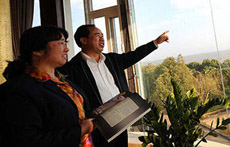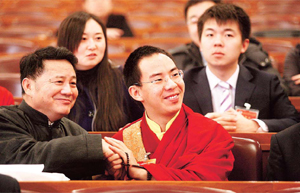Voice from Beijing
(Chinadaily.com.cn)
Updated: 2010-03-01 13:57
China Daily: 'Brighter than the sun' 15/03
It had not come up until the very last minute in Premier Wen Jiabao's two-hour press conference that concludes the annual sessions of the national legislature and political advisory body. But when it did, it became an immediate catch phrase at home.
"I think fairness and justice are more glorious than the sun," said Wen, responding to the last question in yesterday's press session. Which turned out to be the most-quoted line in domestic media. And chances are it will be so for some time to come.
It has to be. In order for our people to live with dignity, as Premier Wen promised in his report on government work, society must be fair and just. And, as Premier Wen observed, fairness and justice constitute the basis for social stability, the overriding concern that dominates the ruling Communist Party's agenda.
Xinhua: China's top legislature ends annual session, endorses Electoral Law amendment 14/03
The National People's Congress (NPC), China's top legislature, ended its annual session Sunday morning after endorsing an amendment to the Electoral Law and the government work report, among others.While delivering a closing speech, top legislator Wu Bangguo said lawmakers at this session offered good suggestions and proposals on accelerating the transformation of the economic growth pattern, a task on the top agenda of the government this year.
The amendment to the Electoral Law, which grants equal representation in legislative bodies to rural and urban people, is of great significance to the improvement of the people's congress system and the development of the socialist democracy, as it could better demonstrate equality among people, regions and ethnic groups.
Wu said the NPC deputies have submitted 506 motions to the session, and the presidium has handed them to NPC special committees for deliberation.
China Daily: Property transparency 12/03
All government officials, those in leading positions in particular, should declare all of their properties and should be supervised from both administrative departments and the public. And though we don't have such an established system, we are on the path of creating one.
If we do believe that such a system will effectively prevent officials from becoming corrupt, why not try it on those who are likely to abuse their power, say those whose spouses and children have already moved overseas?
We need a timetable for the property declaration system. Hopefully, some local governments with the support of the central government will launch it on a trial basis and gather some experience about how the system can better keep power in check.


